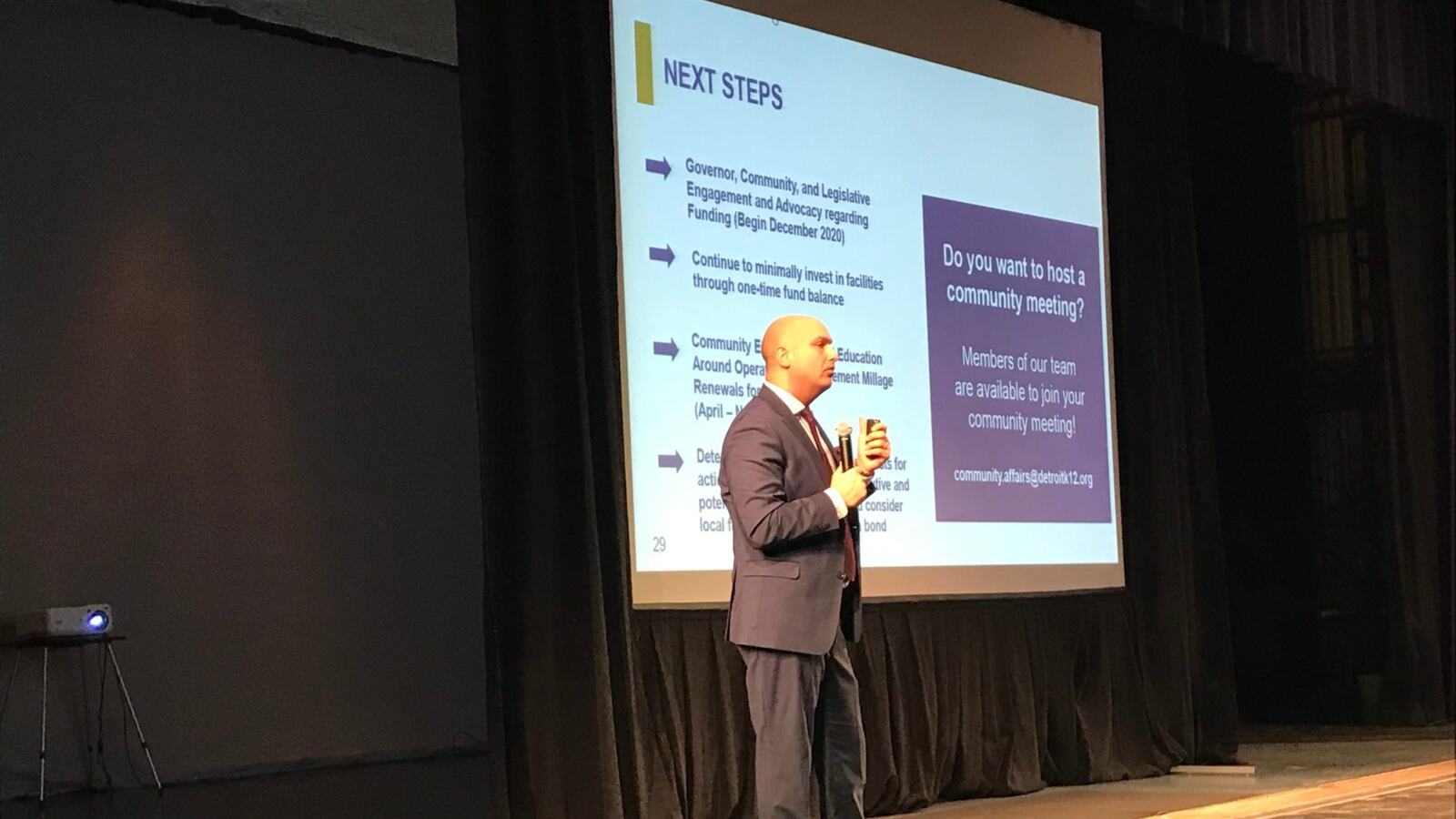The dozens of people who attended the first facilities meeting in the Detroit school district Thursday night walked away armed with information. They also left with marching orders.
“Lansing needs to hear from you,” Angelique Peterson-Mayberry, vice president of the Detroit school board, told people near the end of the meeting. “We need to fight.”
Attendees were urged to reach out to Gov. Gretchen Whitmer and other lawmakers and make a set of demands:
- Provide equal and equitable funding for schools
- Release the district from state oversight
- Give the district the power to seek bond proposals
- Create a pot of state funding districts could tap for building maintenance and repairs
- Create a legislative solution for debt that was created when Detroit schools were controlled by a state-appointed emergency managers.
Those demands are coming as the district faces a $500 million price tag to address the poor building conditions that exist at many of its schools. That price tag is expected to soar to well over $1 billion by 2023 if the district does nothing.
Superintendent Nikolai Vitti said years of disinvestment, particularly during the time emergency managers were in charge, left buildings in such poor shape. And the $617-million plan that in 2016 addressed crushing debt didn’t set aside enough money for facility fixes.
That legislative effort created a separate district — the Detroit Public Schools Community District — to educate students, while the old Detroit Public Schools district exists to collect tax revenue and pay off debt. The deal also left the district under the control of a financial review commission, which must approve all collective bargaining agreements and big contracts. And the deal left the new district without a clear way to ask voters to approve a bond proposal that could be used to repair facilities.
The meeting, held at Detroit Collegiate Preparatory High School at Northwestern, was the first of 11 being held through January to educate the community about the poor condition of many district buildings, and seek input on possible solutions.
Here are some key takeaways from the meeting:
If advocacy doesn’t work, pursue legal action
Vitti said he hopes the advocacy will lead the governor and lawmakers “to do the right thing,” and address the needs listed in the demands.
But if they don’t? Vitti said the district will evaluate the advocacy efforts around April of next year and if there is no progress, the district will pursue “local options and possible legal options.”
“If people aren’t going to do the right thing through the legislative process, then we have to consider holding them accountable to do the right thing through the court system,” Vitti said.
No school closings planned, but people are anxious
Since he first announced the meetings in early November, Vitti has said no school closings are on the table at this time. (There is, however, a proposal on the table to phase out Ludington Magnet Middle School.)
“That’s a top concern for teachers,” said Terrence Martin, president of the Detroit Federation of Teachers, the district’s largest union.
“Anytime our members hear about anything that sounds like reorganization, they think about emergency management and think about the days when schools were closed and members were laid off,” he said on Friday. “We certainly got a number of calls from members.”
The anxieties came up during a question-and-answer session, as Vitti answered questions audience members wrote on cards.
“What will happen to DCP at Northwestern? Are you closing the school?” read one of the questions.
Vitti said no. Enrollment at the school is increasing, he said.
He repeated Thursday night something he’s previously said: that he is committed to keeping current high schools intact.
No ‘good’ buildings in Northwestern boundary; Cass Tech ‘deficient’
Each of the meetings is being held in a different high school, with information about the schools located within the high school’s boundary area.
For Thursday’s meeting at Northwestern, there was some sobering news: None of the schools is considered in good condition, according to the results of a facility audit completed last year, which rated whether schools are in good, fair, deficient or failing condition. They’re labeled based on how much work is needed.
Of the nine schools in the boundary, only one (Detroit School of Arts) was considered in fair condition. Four (Burton, Cass Tech, Douglass, and West Side) are in deficient condition. The rest (DCP, Noble, Sampson, and Thirkell) are in failing condition.
Vitti said Cass Tech may be a surprise, given the age of the building, about 15 years old. He said “there are challenges in the way the building was designed.”
The total amount of needs across the nine schools is $246.5 million.
Recent proposals spur questions
Vitti also fielded questions about recent proposals the district shared with the community, including proposals to require students at two high schools — King and Communication and Media Arts — to take an exam to gain entry. Students who live within a mile of King High, though, would be able to enter without taking an exam.
Critics of the plan say the emphasis on exam schools will wind up excluding students already enrolled in the district. Martin said the policy could harm students who have fallen behind academically, or who don’t have the necessary support at home to take on an exam process that can be daunting for an eighth-grader.
The union would support the plan, Martin said, if it included additional measures to help students tackle the new applications.
“We think that it needs to be tweaked in order for all of our students to be able to take part,” he said.
Vitti argued at Thursday’s meeting that the district needs a mix of traditional high schools and examination schools in order to attract and keep students. It’s what many parents want, he said.
“We lost a lot of our students because we don’t have enough exam seats,” Vitti said.

